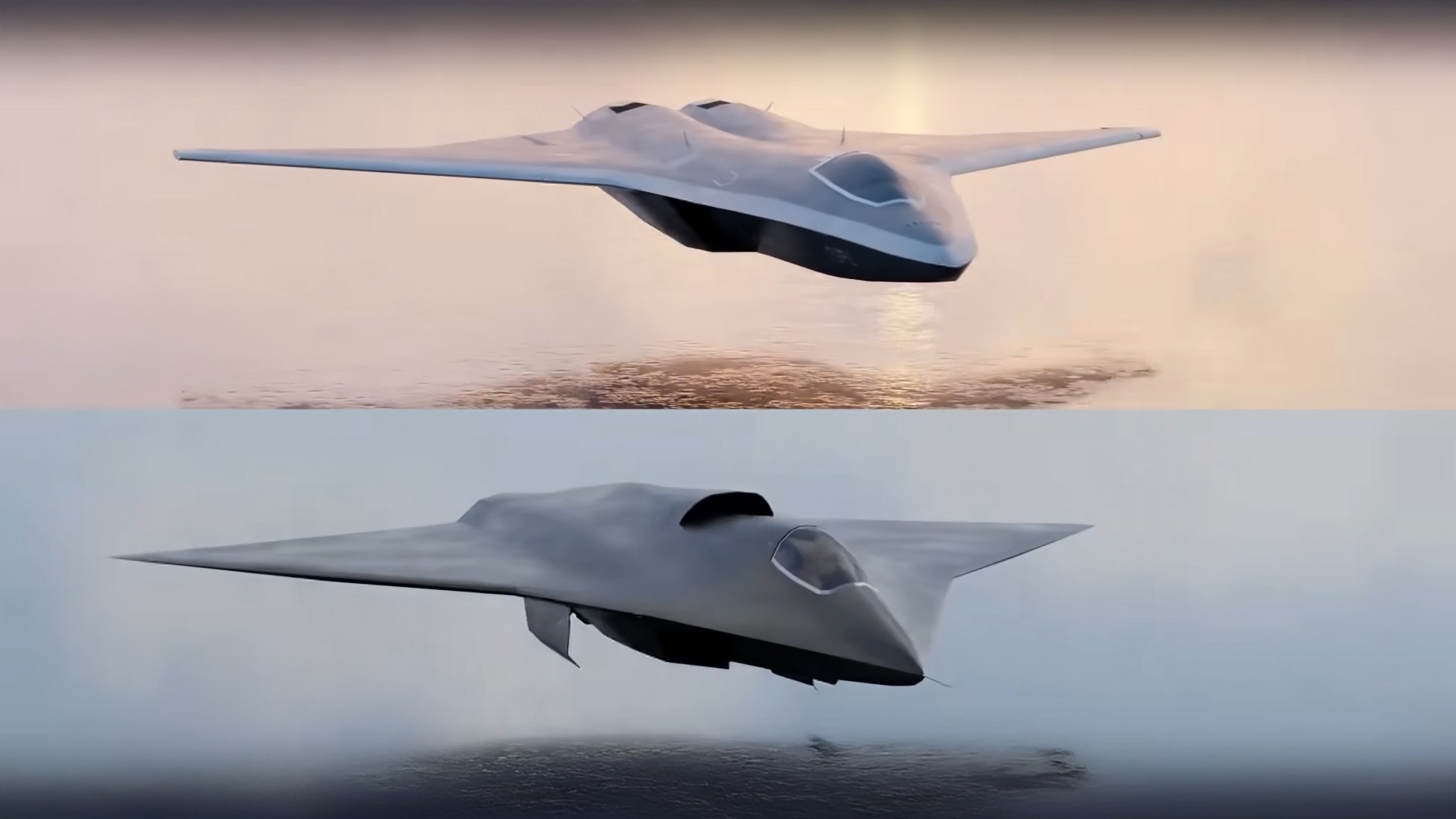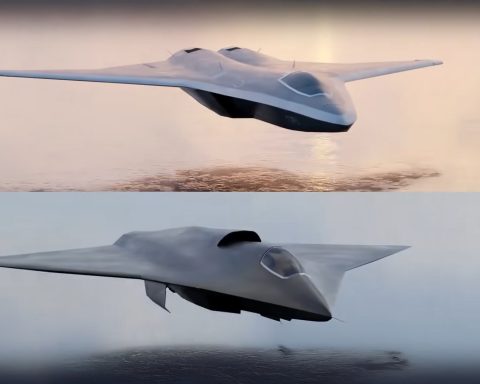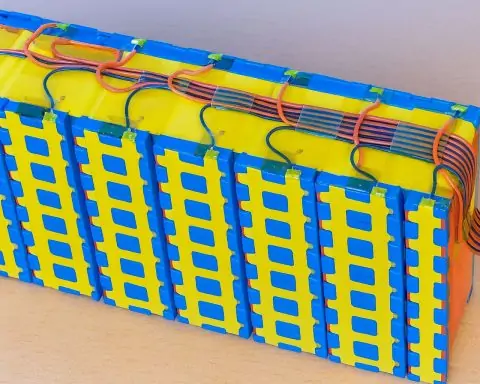- U.S. milestone: The U.S. Air Force says manufacturing of the first Boeing F‑47 airframe is underway; first flight is targeted for 2028. This is the crewed centerpiece of USAF’s Next Generation Air Dominance (NGAD) “family of systems.” Defense News
- Initial numbers: USAF planning documents and senior leaders now point to buying “185+” F‑47s. Congress.gov
- Early performance goals (official): USAF’s own infographic pegs combat radius at “1,000+ nm” and top speed “Mach 2+.” Defense One
- Engines: F‑47 is expected to use adaptive‑cycle engines (GE XA102 vs. Pratt & Whitney XA103) now moving through development; timelines remain tight. Flight Global
- Teaming with drones: F‑47 is designed to fight alongside Collaborative Combat Aircraft (CCA) “loyal wingmen.” USAF down‑selected Anduril and General Atomics for Increment 1. Reuters
- China’s answer: Since Dec. 26, 2024, two tailless Chinese prototypes have appeared in flight testing—
- Chengdu “J‑36” (very heavy, trijet, likely side‑by‑side crew),
- Shenyang “J‑50/J‑XDS” (smaller twinjet with swiveling wingtips). (Designations are unofficial.) Flight Global
- Visual evidence & analysis: Multiple sets of photos/videos and trade‑press analyses describe these airframes’ layouts; Reuters and Janes have corroborated at least the existence of two new tailless designs. Reuters
- Timelines: Chinese officials have previously floated ~2035 for a sixth‑gen capability, which aligns with first‑look prototypes now flying; the U.S. aims to field its NGAD family in the 2030s. Defense News
The roundup
What just happened in the U.S.
In March 2025, the Air Force formally awarded Boeing the NGAD engineering & manufacturing development (EMD) contract and publicly attached the F‑47 designation. The service reiterated that F‑47 is the crewed “crown jewel” of a broader family that includes autonomous wingmen. U.S. Air Force
At the Air & Space Forces Association conference in late September 2025, USAF Chief of Staff Gen. David Allvin said Boeing has begun manufacturing the first F‑47, and USAF is aiming for first flight in 2028. Independent defense outlets echoed that update. Defense News
The White House’s public announcement earlier this year—framing F‑47 as central to countering China—underscored both industrial urgency and political attention to the program. The Washington Post
What’s officially on the spec sheet so far
USAF released a rare infographic in May that, while still high‑level, disclosed two performance markers for F‑47:
- Combat radius: “1,000+ nautical miles”
- Top speed: “Mach 2+”
Multiple outlets recorded the graphic and context. The War Zone
The aircraft is also expected to field adaptive‑cycle propulsion (GE XA102 vs. Pratt & Whitney XA103), a key to the range/thermal‑management the Pacific theater demands; prototype engine work is advancing, though schedules are tight and have seen slips across the broader adaptive‑engine portfolio. Flight Global
How the F‑47 is meant to fight
F‑47 sits inside a “family of systems” concept: the crewed jet plus CCA drones and networked sensors/shooters. For CCA Increment 1, USAF down‑selected Anduril and General Atomics in 2024 and is already shaping Increment 2 work. Reuters
Bottom line: With the first airframe in build and hard range/speed targets on the record, the NGAD team is racing to deliver a system that can penetrate far, survive, and collaborate with autonomous wingmen in the mid‑2030s fight.
China isn’t sleeping: What we know about J‑36 and J‑50/J‑XDS
On Dec. 26, 2024, two tailless Chinese stealth aircraft—one very large from Chengdu, one smaller from Shenyang—broke cover in flight. Imagery and subsequent analysis from reputable defense media have built a consistent picture. (Caveat: names are analyst shorthand; China has not officially confirmed designations.) Reuters
Chengdu “J‑36” (very heavy, trijet)
- Configuration: Large tailless diamond/double‑delta planform with three engines—two low inlets plus a dorsal intake—and no vertical tails. Multiple internal bays suggest large payloads. Flight Global
- Crew: Imagery strongly indicates a side‑by‑side two‑seat cockpit under a broad canopy—unusual for fighters, but consistent with long‑range strike/command roles. The War Zone
- Role (inferred): The size, tri‑jet power, and tailless shaping point to a very‑long‑range, high‑endurance tactical aircraft for deep strike, air dominance at distance, or acting as a manned node for teaming operations. Flight Global
- Status: Multiple sightings since December; close‑range taxi/landing videos and front‑aspect photos have emerged through 2025. Janes and others track continuing flight test activity. janes.com
Shenyang “J‑50 / J‑XDS” (medium‑weight, twinjet)
- Configuration: Tailless “lambda” wing, twin engines with 2D thrust‑vectoring nozzles, diverterless intakes, single‑seat cockpit. A distinctive feature: swiveling wingtip control surfaces to stabilize a tailless airframe across regimes. The War Zone
- Carrier angle? New photos spurred debate about the twin‑wheel nose gear and carrier suitability; analysts caution tailless designs can complicate high‑alpha handling for deck ops. Breaking Defense
- Status: Multiple high‑clarity images in September 2025 gave the best look yet at the airframe on the ground and in flight. The War Zone
Independent corroboration & official timelines
- Reuters reported the emergence of two new tailless Chinese designs shortly after the December reveal, underscoring the novelty of the configurations. Reuters
- FlightGlobal and Janes have since detailed the J‑36’s intake/exhaust layout and assessed that a decade of development/testing may still be required. Flight Global
- Prior public comments from Chengdu’s chief designer Wang Haifeng suggested ~2035 for a sixth‑gen capability—consistent with prototypes appearing now if a full program is in motion. Defense News
Bottom line: China appears to be prototyping two distinct pathways—a super‑heavy trijet and a smaller tailless twinjet—to hedge technology and mission risks, with parallel maturation into the 2030s.
Side‑by‑side: What’s known vs. unknown (October 2025)
| Parameter | F‑47 (US) | J‑36 (China) | J‑50/J‑XDS (China) |
|---|---|---|---|
| Role (declared/inferred) | Crewed air‑dominance centerpiece of NGAD; long‑range “sensor‑shooter” working with CCAs. U.S. Air Force | Very heavy tailless, trijet; likely long‑range strike/air‑dominance/command node. Flight Global | Medium tailless twinjet; agility aided by 2D vectoring and swiveling wingtips; possibly land‑based first, carrier‑capable debated. The War Zone |
| Configuration | Tailless‑leaning stealth, details classified; digital/open architecture. | Tailless diamond/double‑delta; dorsal + ventral inlets, internal bays, no vertical tails. Flight Global | Tailless lambda wing; DSI intakes; 2D TVC nozzles; single‑seat. The War Zone |
| Engines | Adaptive‑cycle (GE XA102 / P&W XA103) in NGAP. Flight Global | Three turbofans (type unknown). Flight Global | Two turbofans (type unknown). The War Zone |
| Crew | 1 | 2 (side‑by‑side), based on imagery. The War Zone | 1 |
| Combat radius (public) | 1,000+ nm (USAF graphic). The War Zone | Not disclosed. | Not disclosed. |
| Max speed (public) | Mach 2+ (USAF graphic). Defense One | Not disclosed. | Not disclosed. |
| Teaming | Native to CCA manned‑unmanned teaming. Reuters | Implied heavy C2/teaming role by size/crew. | Tailless agility aids survivability; teaming probable but unconfirmed. |
| Program status (Oct 2025) | First airframe in build; first flight 2028 target; buy of 185+ planned. Defense News | Flight‑test activity visible via multiple sightings since Dec 2024; no official designation. Default | Flight‑test sightings with growing photo clarity in Sept 2025; no official designation. The War Zone |
Strategic takeaways
- Range is king in the Pacific. USAF’s explicit 1,000+ nm radius target for F‑47 reflects tanker vulnerability and vast distances. China’s very‑heavy J‑36 and tailless shaping point to a parallel focus on endurance and survivability. The War Zone
- Propulsion & thermal margin are pacing items. Adaptive engines underpin F‑47’s range/sensor power; schedules are aggressive and could ripple into flight‑test tempo and early production. Flight Global
- Families of systems, not single jets. America’s CCA is as disruptive as the fighter itself; China’s prototypes likely pair with a growing ecosystem of loyal‑wingman UAVs and long‑range weapons. Reuters
- China is hedging with two designs. Running Chengdu and Shenyang prototypes in parallel shortens learning cycles and lets Beijing choose (or blend) concepts for production later in the decade. janes.com
- Nomenclature caution. “J‑36” and “J‑50/J‑XDS” are analyst labels, not official PLAAF designations; final names and exact missions will likely change as programs mature. janes.com
What we still don’t know
- F‑47 unit cost, detailed avionics/weapons fit, and exact stealth geometry remain classified. U.S. Air Force
- Chinese propulsion and mission systems maturity (sensors, data‑fusion, networking, electronic warfare) are unconfirmed; imagery reveals airframes, not full combat capability. Default
- Carrier operations feasibility for a tailless J‑50 is debated among experts. Breaking Defense
Sources worth your time
- The Air Force’s official F‑47/NGAD contract announcement with leadership quotes and program framing. U.S. Air Force
- Washington Post’s report on the F‑47 selection and political/industrial context. The Washington Post
- Defense News and Breaking Defense on manufacturing start and first‑flight timeline. Defense News
- The War Zone/Janes/FlightGlobal for forensic looks at China’s J‑36 and J‑50/J‑XDS layouts and testing bread‑crumbs. Flight Global
- Reuters coverage confirming two novel Chinese tailless designs appeared in late 2024. Reuters
Note: Where figures are described as “official,” they come from USAF’s own public infographic or statements. Chinese program names/specs remain unofficial and inferred from imagery and defense‑analyst reporting; Beijing has not released formal designations or performance data for these prototypes.












